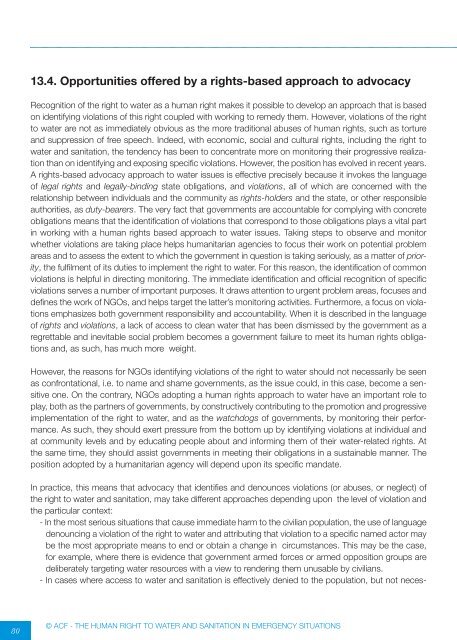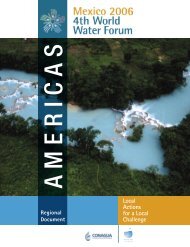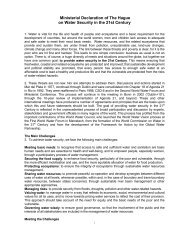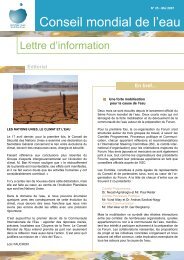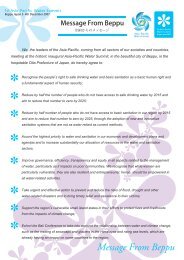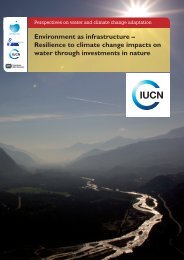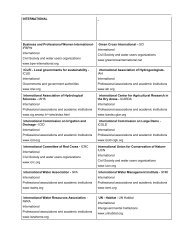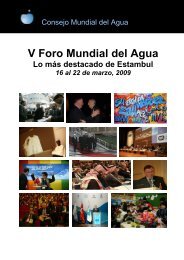the human right to water and sanitation in emergency situations
the human right to water and sanitation in emergency situations
the human right to water and sanitation in emergency situations
Create successful ePaper yourself
Turn your PDF publications into a flip-book with our unique Google optimized e-Paper software.
80<br />
13.4. opportunities offered by a <strong>right</strong>s-based approach <strong>to</strong> advocacy<br />
Recognition of <strong>the</strong> <strong>right</strong> <strong>to</strong> <strong>water</strong> as a <strong>human</strong> <strong>right</strong> makes it possible <strong>to</strong> develop an approach that is based<br />
on identify<strong>in</strong>g violations of this <strong>right</strong> coupled with work<strong>in</strong>g <strong>to</strong> remedy <strong>the</strong>m. However, violations of <strong>the</strong> <strong>right</strong><br />
<strong>to</strong> <strong>water</strong> are not as immediately obvious as <strong>the</strong> more traditional abuses of <strong>human</strong> <strong>right</strong>s, such as <strong>to</strong>rture<br />
<strong>and</strong> suppression of free speech. Indeed, with economic, social <strong>and</strong> cultural <strong>right</strong>s, <strong>in</strong>clud<strong>in</strong>g <strong>the</strong> <strong>right</strong> <strong>to</strong><br />
<strong>water</strong> <strong>and</strong> <strong>sanitation</strong>, <strong>the</strong> tendency has been <strong>to</strong> concentrate more on moni<strong>to</strong>r<strong>in</strong>g <strong>the</strong>ir progressive realization<br />
than on identify<strong>in</strong>g <strong>and</strong> expos<strong>in</strong>g specific violations. However, <strong>the</strong> position has evolved <strong>in</strong> recent years.<br />
A <strong>right</strong>s-based advocacy approach <strong>to</strong> <strong>water</strong> issues is effective precisely because it <strong>in</strong>vokes <strong>the</strong> language<br />
of legal <strong>right</strong>s <strong>and</strong> legally-b<strong>in</strong>d<strong>in</strong>g state obligations, <strong>and</strong> violations, all of which are concerned with <strong>the</strong><br />
relationship between <strong>in</strong>dividuals <strong>and</strong> <strong>the</strong> community as <strong>right</strong>s-holders <strong>and</strong> <strong>the</strong> state, or o<strong>the</strong>r responsible<br />
authorities, as duty-bearers. The very fact that governments are accountable for comply<strong>in</strong>g with concrete<br />
obligations means that <strong>the</strong> identification of violations that correspond <strong>to</strong> those obligations plays a vital part<br />
<strong>in</strong> work<strong>in</strong>g with a <strong>human</strong> <strong>right</strong>s based approach <strong>to</strong> <strong>water</strong> issues. Tak<strong>in</strong>g steps <strong>to</strong> observe <strong>and</strong> moni<strong>to</strong>r<br />
whe<strong>the</strong>r violations are tak<strong>in</strong>g place helps <strong>human</strong>itarian agencies <strong>to</strong> focus <strong>the</strong>ir work on potential problem<br />
areas <strong>and</strong> <strong>to</strong> assess <strong>the</strong> extent <strong>to</strong> which <strong>the</strong> government <strong>in</strong> question is tak<strong>in</strong>g seriously, as a matter of priority,<br />
<strong>the</strong> fulfilment of its duties <strong>to</strong> implement <strong>the</strong> <strong>right</strong> <strong>to</strong> <strong>water</strong>. For this reason, <strong>the</strong> identification of common<br />
violations is helpful <strong>in</strong> direct<strong>in</strong>g moni<strong>to</strong>r<strong>in</strong>g. The immediate identification <strong>and</strong> official recognition of specific<br />
violations serves a number of important purposes. It draws attention <strong>to</strong> urgent problem areas, focuses <strong>and</strong><br />
def<strong>in</strong>es <strong>the</strong> work of NGOs, <strong>and</strong> helps target <strong>the</strong> latter’s moni<strong>to</strong>r<strong>in</strong>g activities. Fur<strong>the</strong>rmore, a focus on violations<br />
emphasizes both government responsibility <strong>and</strong> accountability. When it is described <strong>in</strong> <strong>the</strong> language<br />
of <strong>right</strong>s <strong>and</strong> violations, a lack of access <strong>to</strong> clean <strong>water</strong> that has been dismissed by <strong>the</strong> government as a<br />
regrettable <strong>and</strong> <strong>in</strong>evitable social problem becomes a government failure <strong>to</strong> meet its <strong>human</strong> <strong>right</strong>s obligations<br />
<strong>and</strong>, as such, has much more weight.<br />
However, <strong>the</strong> reasons for NGOs identify<strong>in</strong>g violations of <strong>the</strong> <strong>right</strong> <strong>to</strong> <strong>water</strong> should not necessarily be seen<br />
as confrontational, i.e. <strong>to</strong> name <strong>and</strong> shame governments, as <strong>the</strong> issue could, <strong>in</strong> this case, become a sensitive<br />
one. On <strong>the</strong> contrary, NGOs adopt<strong>in</strong>g a <strong>human</strong> <strong>right</strong>s approach <strong>to</strong> <strong>water</strong> have an important role <strong>to</strong><br />
play, both as <strong>the</strong> partners of governments, by constructively contribut<strong>in</strong>g <strong>to</strong> <strong>the</strong> promotion <strong>and</strong> progressive<br />
implementation of <strong>the</strong> <strong>right</strong> <strong>to</strong> <strong>water</strong>, <strong>and</strong> as <strong>the</strong> watchdogs of governments, by moni<strong>to</strong>r<strong>in</strong>g <strong>the</strong>ir performance.<br />
As such, <strong>the</strong>y should exert pressure from <strong>the</strong> bot<strong>to</strong>m up by identify<strong>in</strong>g violations at <strong>in</strong>dividual <strong>and</strong><br />
at community levels <strong>and</strong> by educat<strong>in</strong>g people about <strong>and</strong> <strong>in</strong>form<strong>in</strong>g <strong>the</strong>m of <strong>the</strong>ir <strong>water</strong>-related <strong>right</strong>s. At<br />
<strong>the</strong> same time, <strong>the</strong>y should assist governments <strong>in</strong> meet<strong>in</strong>g <strong>the</strong>ir obligations <strong>in</strong> a susta<strong>in</strong>able manner. The<br />
position adopted by a <strong>human</strong>itarian agency will depend upon its specific m<strong>and</strong>ate.<br />
In practice, this means that advocacy that identifies <strong>and</strong> denounces violations (or abuses, or neglect) of<br />
<strong>the</strong> <strong>right</strong> <strong>to</strong> <strong>water</strong> <strong>and</strong> <strong>sanitation</strong>, may take different approaches depend<strong>in</strong>g upon <strong>the</strong> level of violation <strong>and</strong><br />
<strong>the</strong> particular context:<br />
- In <strong>the</strong> most serious <strong>situations</strong> that cause immediate harm <strong>to</strong> <strong>the</strong> civilian population, <strong>the</strong> use of language<br />
denounc<strong>in</strong>g a violation of <strong>the</strong> <strong>right</strong> <strong>to</strong> <strong>water</strong> <strong>and</strong> attribut<strong>in</strong>g that violation <strong>to</strong> a specific named ac<strong>to</strong>r may<br />
be <strong>the</strong> most appropriate means <strong>to</strong> end or obta<strong>in</strong> a change <strong>in</strong> circumstances. This may be <strong>the</strong> case,<br />
for example, where <strong>the</strong>re is evidence that government armed forces or armed opposition groups are<br />
deliberately target<strong>in</strong>g <strong>water</strong> resources with a view <strong>to</strong> render<strong>in</strong>g <strong>the</strong>m unusable by civilians.<br />
- In cases where access <strong>to</strong> <strong>water</strong> <strong>and</strong> <strong>sanitation</strong> is effectively denied <strong>to</strong> <strong>the</strong> population, but not neces-<br />
© ACF - THE HUMAN RIGHT TO WATER AND SANITATION IN EMERGENCY SITUATIONS


